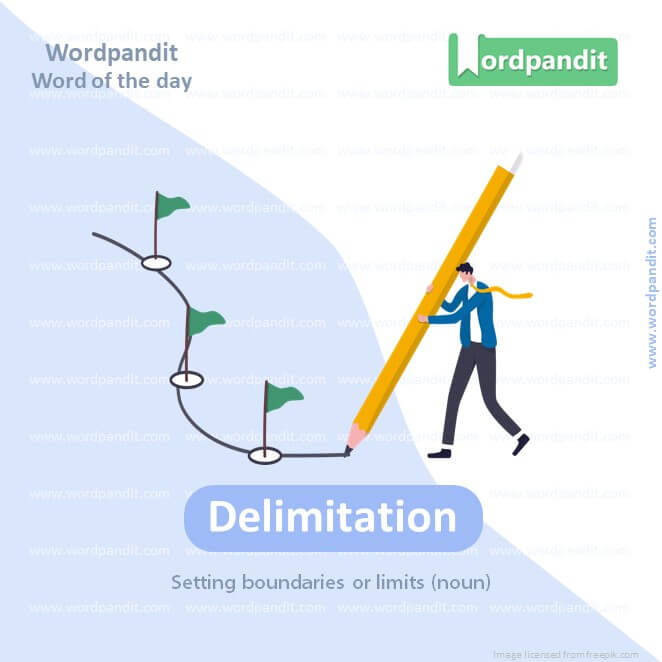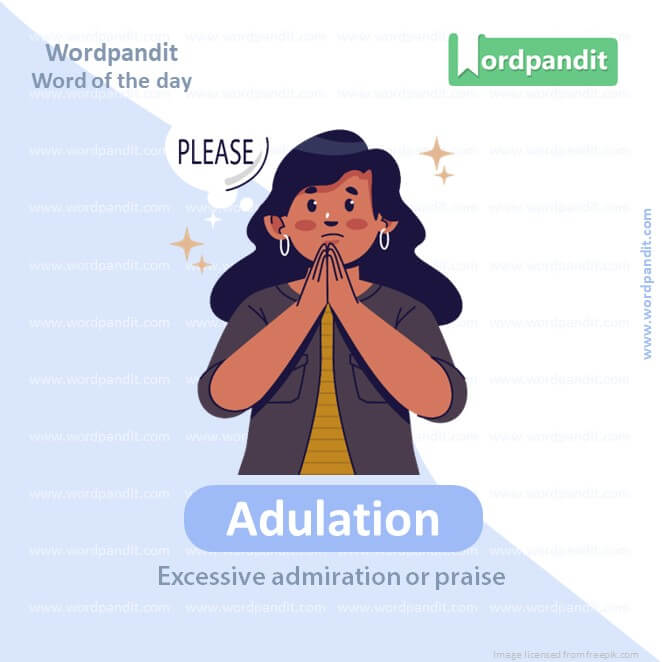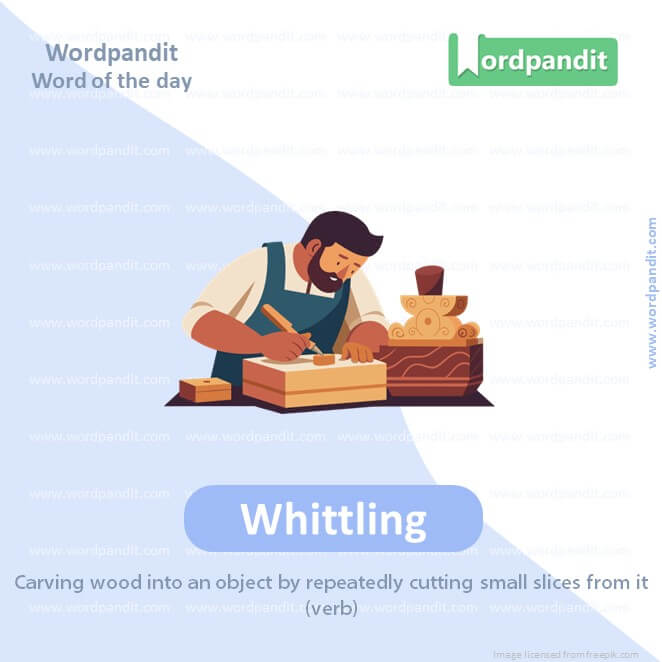Daily Vocabulary Words: List of Daily Used Words
Hi there. Welcome to this special section @ Wordpandit.
Our endeavour here is straightforward: highlighting important daily vocabulary words, you would encounter in The Hindu. This is your repository of commonly used words; essentially, we are posting a list of daily used words. Hence, this has significant practical application as it teaches you words that are commonly used in a leading publication such as The Hindu.
Visit the website daily to learn words from The Hindu.
WORD-1: Dampening
CONTEXT: A stocktaking exercise on voter participation across the country reveals a significant dampening in turnout in this set of elections in comparison to the 2019 and even the 2014 general elections.
SOURCE: Not provided
EXPLANATORY PARAGRAPH: Imagine you are playing with a sponge and start to squeeze it into some water. The sponge starts to get a little wet but not completely soaked. “Dampening” is like that—it means making something a bit wet or less strong, like turning down the volume of music just a little.
MEANING: Making slightly wet or reducing the intensity of something (verb).
PRONUNCIATION: DAM-puh-ning
SYNONYMS: moistening, softening, deadening, muting, toning down
USAGE EXAMPLE:
1. The light rain was dampening the ground.
2. He tried dampening the noise with some cushions.
3. The news had a dampening effect on the celebration.
4. Dampening the cloth, she began to wipe the dust off the table.

WORD-2: Delimitation
CONTEXT: The high number of seats that encountered a dip in voter participation is unprecedented since the latest delimitation that was conducted prior to the 2009 general election.
SOURCE: Not provided
EXPLANATORY PARAGRAPH: Imagine you and your friends decide to play a game in a part of the playground. You use stones to mark where you can play so everyone knows the space. “Delimitation” is like that—it means setting the boundaries or limits of something.
MEANING: Setting boundaries or limits (noun).
PRONUNCIATION: dee-lim-i-TAY-shun
SYNONYMS: demarcation, definition, boundary setting, limitation, bordering
USAGE EXAMPLE:
1. The delimitation of the marine park was essential for its protection.
2. There was a discussion on the delimitation of roles within the team.
3. The treaty involved the delimitation of the two countries’ borders.
4. Delimitation of the study area was crucial for the research.
WORD-3: Outnumbering
CONTEXT: Inter-State migration been a factor which possibly explains the low turnout in the northern and central States? Bihar, for example, has seen a significant gender gap, with women voters far outnumbering men in participation in percentage terms.
SOURCE: Not provided
EXPLANATORY PARAGRAPH: Imagine you are playing a team game where your team has 10 players and the other team has only 5. Your team has more players, so you are “outnumbering” the other team, which means you have more people or things than the other side.
MEANING: Having more in number than another group (verb).
PRONUNCIATION: owt-NUM-buhr-ing
SYNONYMS: exceeding, surpassing, overrunning, dominating, outweighing
USAGE EXAMPLE:
1. The ants were outnumbering the bees in the garden.
2. In the debate, her supporters were outnumbering her opponents.
3. The company’s products are outnumbering those of its rival in stores.
4. She felt outnumbered at the meeting, where everyone else disagreed with her.

WORD-4: Valedictory
CONTEXT: It was only the fourth time in 116 matches that the Spaniard had lost on Parisian clay, and the moment, more than any in recent times, had a valedictory feel to it.
SOURCE: Not provided
EXPLANATORY PARAGRAPH: Think about the last day of school when one of the older students gives a special goodbye speech to everyone. That speech is called a “valedictory.” It’s a way of saying farewell and remembering all the good times before saying goodbye.
MEANING: Serving as a farewell (adjective).
PRONUNCIATION: val-uh-DIK-tuh-ree
SYNONYMS: farewell, departing, goodbye, concluding, final
USAGE EXAMPLE:
1. He gave a valedictory speech at graduation.
2. The principal’s valedictory address was very touching.
3. The event concluded with a valedictory ceremony.
4. Her valedictory note thanked everyone for their support.

WORD-5: Adulation
CONTEXT: He played in Barcelona, Madrid and Rome — places where he has collectively secured 27 trophies — soaking in the fans’ adulation in what has come to resemble a much-deserved victory lap.
SOURCE: Not provided
EXPLANATORY PARAGRAPH: Imagine if you made a really cool drawing and everyone in your class started clapping and saying how amazing it was. “Adulation” is when people give a lot of praise and attention to someone because they really, really like what that person has done.
MEANING: Excessive admiration or praise.
PRONUNCIATION: ad-yoo-LAY-shun
SYNONYMS: flattery, idolization, worship, hero-worship, glorification
USAGE EXAMPLE:
1. The movie star enjoyed the adulation of her fans.
2. He received adulation wherever he went after winning the championship.
3. The author was uncomfortable with the adulation from his readers.
4. Her performance earned her the adulation of the critics.
WORD-6: Revamped
CONTEXT: He is without a title this season and has revamped his entire support staff to jump-start his year.
SOURCE: Not provided
EXPLANATORY PARAGRAPH: Imagine your old toy car is a bit broken and not as fun to play with anymore. So, you decide to fix it and even paint it a new color to make it better. “Revamped” means changing something old or used to make it better and like new again.
MEANING: Renovated or improved to make better or more appealing (verb).
PRONUNCIATION: ree-VAMPED
SYNONYMS: renovated, renewed, overhauled, updated, refurbished
USAGE EXAMPLE:
1. The company revamped its website to attract more customers.
2. She revamped the old recipe to make it healthier.
3. The program was revamped to improve its effectiveness.
4. The old hotel was completely revamped before reopening.
WORD-7: Procedural
CONTEXT: The criteria were liberally interpreted, the procedural threshold laid down for admission turned out to be decisive and difficult, and was dictated by the political exigencies of the five permanent members (P5) in the UNSC at any given time.
SOURCE: Not provided
EXPLANATORY PARAGRAPH: Think about the steps you follow in a board game, like rolling the dice and then moving your piece. These steps are important to play the game right. “Procedural” is a word that describes these steps or rules that you follow to do something correctly.
MEANING: Relating to the rules or procedures that must be followed to get something done (adjective).
PRONUNCIATION: proh-SEE-jur-uhl
SYNONYMS: methodical, systematic, routine, formal, regulatory
USAGE EXAMPLE:
1. There was a procedural error during the application process.
2. The procedural guidelines must be followed by all employees.
3. He is familiar with the procedural aspects of filing a lawsuit.
4. Procedural delays slowed down the project.

WORD-8: Prerequisite
CONTEXT: The Court ruled in 1948 that the UNSC’s recommendation is a prerequisite for the UNGA to exercise its power.
SOURCE: Not provided
EXPLANATORY PARAGRAPH: Imagine you want to build a big puzzle but need to find the corner pieces first to start. These pieces are needed before you can do the rest. A “prerequisite” is something just like those corner pieces; it’s something you must have or do before you can do something else.
MEANING: Required as a condition for something else to happen; a thing that is
required as a prior condition (noun).
PRONUNCIATION: pree-REK-wuh-zit
SYNONYMS: requirement, precondition, necessity, essential, stipulation
USAGE EXAMPLE:
1. Passing the introductory course is a prerequisite for the advanced class.
2. A prerequisite for the job is having at least two years of experience.
3. He lacked the prerequisites to enroll in the program.
4. Fulfilling the prerequisites ensured her eligibility for the scholarship.
WORD-9: Turbulent
CONTEXT: The liquor policy has always been a politically turbulent and socially sensitive subject.
SOURCE: Not provided
EXPLANATORY PARAGRAPH: Imagine being on a boat in the ocean when big waves start rocking the boat back and forth. It’s a little scary because it’s so rough. “Turbulent” describes something that is wild or unstable, like those big ocean waves.
MEANING: Characterized by conflict, disorder, or confusion; not controlled or calm (adjective).
PRONUNCIATION: TUR-byuh-luhnt
SYNONYMS: chaotic, rough, stormy, tumultuous, unruly
USAGE EXAMPLE:
1. The meeting was turbulent with many people arguing.
2. They flew through turbulent skies.
3. The country went through a turbulent period of history.
4. His turbulent emotions made him unpredictable.

WORD-10: Whittling
CONTEXT: On the one hand, the Church and Muslim social organisations have always called for a puritanical liquor policy aimed at whittling alcohol availability and putting the State on a path to total prohibition.
SOURCE: Not provided
EXPLANATORY PARAGRAPH: Imagine taking a piece of wood and a small knife, then carefully cutting little shavings off to make a shape, like a small animal or a boat. “Whittling” is when you carve or shape wood by cutting off small pieces.
MEANING: Carving wood into an object by repeatedly cutting small slices from it (verb).
PRONUNCIATION: WHIT-ling
SYNONYMS: carving, sculpting, shaping, paring, trimming
USAGE EXAMPLE:
1. He spent the afternoon whittling a figure out of a block of pine.
2. Whittling is a relaxing hobby for many people.
3. She taught her grandson the basics of whittling.
4. He was skilled in whittling intricate designs into walking sticks.
Vocabulary Words with Meaning
Penetrating the rich tapestry of language, the essence of ‘vocabulary words with meaning’ is a crucial aspect. It’s these seeds of knowledge that bud into fluent conversations and comprehensive understanding. The knack of grasping ‘vocabulary words with meaning’ is pivotal in language learning, but it demands a nuanced approach and strategy.
Learning ‘vocabulary words with meaning’ isn’t about mechanically memorizing heaps of words. It’s about building connections and creating a profound understanding of these words. A promising approach to assimilate ‘vocabulary words with meaning’ involves utilizing a wide range of resources including literature, films, music, and digital content. This immersion provides a broad context and diverse settings for these words, simplifying their comprehension and use.
When you’re focusing on ‘vocabulary words with meaning’, remember to incorporate memory-enhancing techniques into your learning regimen. Tools like flashcards or recall-based applications can aid significantly in long-term retention of these words. Additionally, mnemonic strategies, associating words with distinctive images or stories enhance memory recall and understanding.
The journey of mastering ‘vocabulary words with meaning’ also benefits greatly from practice and application. Engage in conversations using the language, express your thoughts in writing, and try to incorporate newly learned words into your routine. This not only enhances your familiarity with the words but also aids in an intimate understanding of their connotations and denotations.
To sum up, learning ‘vocabulary words with meaning’ is akin to assembling a jigsaw puzzle: it requires patience, strategy, and persistence. But the picture that finally emerges is a beautiful tapestry of language – vivid, articulate, and expressive. So, set your sails toward the voyage of ‘vocabulary words with meaning’, and discover the joy of speaking and understanding a language with finesse.











